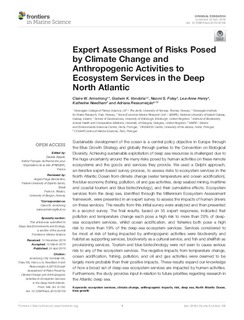| dc.description.abstract | Sustainable development of the ocean is a central policy objective in Europe through the Blue Growth Strategy and globally through parties to the Convention on Biological Diversity. Achieving sustainable exploitation of deep sea resources is challenged due to the huge uncertainty around the many risks posed by human activities on these remote ecosystems and the goods and services they provide. We used a Delphi approach, an iterative expert-based survey process, to assess risks to ecosystem services in the North Atlantic Ocean from climate change (water temperature and ocean acidification), the blue economy (fishing, pollution, oil and gas activities, deep seabed mining, maritime and coastal tourism and blue biotechnology), and their cumulative effects. Ecosystem services from the deep sea, identified through the Millennium Ecosystem Assessment framework, were presented in an expert survey to assess the impacts of human drivers on these services. The results from this initial survey were analyzed and then presented in a second survey. The final results, based on 55 expert responses, indicated that pollution and temperature change each pose a high risk to more than 28% of deep-sea ecosystem services, whilst ocean acidification, and fisheries both pose a high risk to more than 19% of the deep-sea ecosystem services. Services considered to be most at risk of being impacted by anthropogenic activities were biodiversity and habitat as supporting services, biodiversity as a cultural service, and fish and shellfish as provisioning services. Tourism and blue biotechnology were not seen to cause serious risk to any of the ecosystem services. The negative impacts from temperature change, ocean acidification, fishing, pollution, and oil and gas activities were deemed to be largely more probable than their positive impacts. These results expand our knowledge of how a broad set of deep-sea ecosystem services are impacted by human activities. Furthermore, the study provides input in relation to future priorities regarding research in the Atlantic deep sea. | nb_NO |

